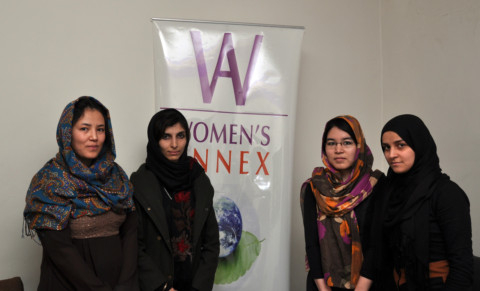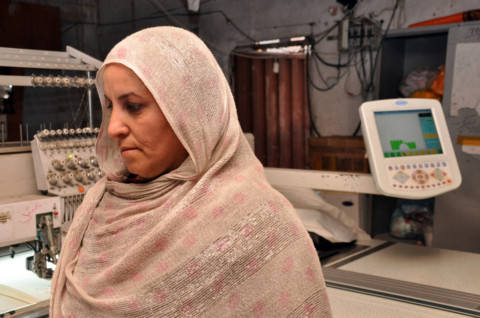
Off a dusty, unpaved street near Kabul University, Roya Mahboob’s software company is designing a web platform to let Afghan women create content from home even if Taliban militants return to power and curb their rights.
“I just make myself more invisible in the society” while “becoming more visible” on the internet, Mahboob, 26, a computer science graduate of Herat University, said of her tactic for coping with opposition in a country that faces potential upheaval after international combat troops leave at the end of this year.
Retreating behind the electronic veil of the internet isn’t an option for Zarghuna Sherzad, 46, a partner in Jahan Guldozi, an embroidery factory that employs 20 women about 5 kilometres from Mahboob’s office in Kabul.
“I grew up in the war, and I’ve spent a very difficult time in the past,” she said through an interpreter at her factory, recalling that when the Taliban ruled Afghanistan before the American invasion in 2001, she endured beatings just for wearing sandals that showed her feet. “I’m always praying that regime should not be repeated.”
Women such as Mahboob and Sherzad are at risk of losing the freedoms they have won since the United States and its allies upended the Taliban, who cited their interpretation of the Quran to ban girls from attending schools and women from leaving their homes. Those gains already are under stress as international combat forces prepare to leave by the end of this year.
“Insecurity might increase at the provincial level, and that could limit the freedom of women, particularly their movement in terms of their political participation in the provinces and in terms of their businesses,” said Nilofar Sakhi, executive director of the International Center for Afghan Women’s Economic Development at the American University of Afghanistan.
Afghan women have gained legal rights and protections in the past decade. Women are now 27 per cent of the country’s parliament and have started to join police forces. A decree signed by President Hamid Karzai in 2009 made rape a crime for the first time, while also banning violence against women, child marriage, forced marriage and the denial of rights to education or work.
Those gains are tentative, the International Crisis Group said in an October report, “Women and Conflict in Afghanistan”. The decree signed by Karzai has yet to be ratified by the Parliament, where conservative lawmakers have called it unIslamic, the group said. The country’s new electoral law calls for reducing a quota for female parliamentarians to 20 per cent from 25 per cent.
Since Afghan National Security Forces took the lead role from US and other foreign forces in the middle of last year, “insurgent threats to women have increased”, according to the Brussels-based group. Women’s rights “are also under attack from yesterday’s warlords, now power brokers both within and outside government”.
While some of the candidates for president have affirmed their support for women’s rights, the Taliban say that if they return to rule or share power they will bar women from wearing Western clothes and girls from sharing classrooms with boys.
“A change in the present Afghan constitution is highly required to keep Afghan women’s rights low,” Zabihullah Mujahed, a Taliban spokesman, said in a phone interview.
Women in public roles increasingly have come under attack. On January 2, two gunmen on a motorbike in the western Afghan city of Herat shot to death Yalda Waziri, 25, who worked for the local government, according to the BBC. In the same province, Lieutenant Negar, 38, a female police official who like many Afghans went by one name, was shot and killed in September, a few months after her female predecessor was killed in a similar fashion, the BBC reported.
“There are real fears of losing the progress that has been made,” said Afshan Khan, chief executive officer of Women for Women International, a Washington-based non-profit group that helps women in war-torn countries rebuild their lives.
In the past decade, Women for Women has trained 46,000 Afghan women, providing them with skills to operate small businesses. The group also has distributed $26 million (Dh95 million) in stipends and microcredits, Khan said.
Sherzad, who had no schooling and raised two daughters after her husband disappeared, graduated from Women for Women’s one-year training programme. She teamed up two years ago with Nesar Ahmad to expand the embroidery business he operated.
Together, they have invested $250,000 in computerised Chinese machines that make decorative embroidered panels. Afghans sew the embroidery on to a shalwar-kameez, a loose-fitting tunic and pyjamas worn by men in the country.
In addition to the 20 workers at the factory, the company employs 300 women who work from their homes and turn out handmade embroidery, Sherzad said. The products are sold in Afghanistan as far west and south as Herat and Kandahar, generating a profit of about $5,000 a month, the co-owners said in interviews.
In a country where conservative Islamic groups still forbid mixing genders, the partnership between Ahmad, 50, and Sherzad stands out all the more because they belong to tribes that traditionally have clashed. She is a Pashtun, a Sunni majority group from the south that includes the Taliban, and he is a Hazara, a predominantly Shiite minority group from the north.
Sherzad’s family, including her missing husband’s brother and other Pashtun men, “were against the partnership because I’m a Hazara”, Ahmad said through an interpreter. He said he persisted because “she has very good skills in marketing, and knows how to encourage people, and how to talk to people and sell products”.
Ahmad said he prevailed by telling Sherzad’s brother-in-law: “If you’re feeling so protective about her, why don’t you provide food for her and her two daughters? If you can, that’s OK. But if you’re not, then she should be able to work.”
Amid uncertainty over a presidential election scheduled for April and the departure of most foreign troops by year-end, “there’s a fear if Taliban return to power, we’ll lose all the progress we’ve made”, Ahmad said. “She will not be able to come work here, and I will not be able to reach her.”
In contrast, a select group of Afghan girls and women who have grown up in the past decade, gone to school and are familiar with computers may find online sanctuary if Mahboob’s online initiative succeeds.
Internet penetration in Afghanistan has grown to 5.5 web users per 100 people in 2012 from 1 per 1,000 in 2003, according to World Bank data. By comparison, Afghanistan’s neighbour Pakistan had 10 internet users per 100 people in 2012, according to the bank.
Mahboob, whose Afghan Citadel Software Co was started with the help of the US Defense Department’s Task Force for Business and Stability Operations, has developed an online blogging and film platform called Women’s Annex.
It lets women work from their homes to produce content that is then featured on social-media websites. Advertising revenue generated by the sites is shared with the content creators, Mahboob said.
“We have created a technology that shows influence” and a scoring system that indicates the popularity of content that members of the Women’s Annex develop, Mahboob said. “Based on that they can make $5 to $100 a day” depending on how popular their blog or story is, she said.
The average daily wage for an Afghan construction worker in 2012 was $5.70, according to the UN Office on Drugs and Crime. Among the few jobs paying more than what Mahboob cited as the minimum women can earn online is the thriving drug trade: Collecting opium gum from poppies yields $11.70 a day, the agency found.
Mahboob’s business is based on Film Annex, a technology that her Italian business partner, philanthropist Francesco Rulli, developed to create web videos. Mahboob’s company also has developed an online examination and vocational training tool called Examer that she is promoting to Afghan schools, as well as to other countries in the region.
Mahboob — who was named one of Time magazine’s 100 most influential people in the world last year because of her role as a female entrepreneur working to expand internet access for women — says a conservative interpretation of Islamic theology isn’t the only force threatening to confine Afghan women behind closed doors.
She said they also must contend with common criminals, as well as men envious of a successful woman.
“I’m worried about kidnapping or they say bad stuff about me,” Mahboob said. Those are all reasons why “I’ve shifted my business to work online and want to give these tools to other women”, Mahboob said.
“Even if the Taliban are back, women can get online education, even if fighting starts,” she said, before pausing to acknowledge a potential weakness in her plans.
“If fighting starts, then I don’t know if the internet will be available,” she said.












